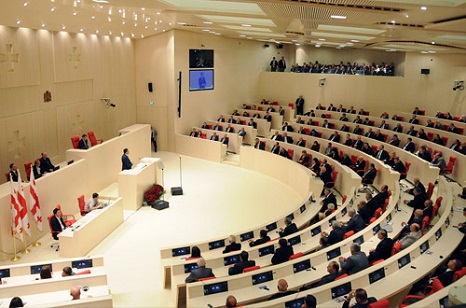Georgian Parliament discusses ways to stop illegal surveillance

Major changes are ahead to prevent illegal surveillance of Georgian citizens.
In Parliament today it was announced law enforcement agencies will have direct control over data collected in telecommunication provider companies’ servers until November 1. On this date, Parliament is due to introduce a new bill to regulate this issue.
Illegal surveillance became a subject of intense discussion in Georgia following the revelation thousands of secret video recordings were kept by the former government.
At a Parliamentary Committee for Legal Affairs meeting yesterday, it was decided a special commission would be created to work on new surveillance guidelines.
Those involved in the commission will be members of Parliament (MPs) law enforcers, representatives from non-governmental organisations (NGO) and international experts. The commission will be tasked to complete their duties until November 1, 2014.
Today, members of the parliamentary minority and NGO representatives said they wanted the Interior Ministry to have limited access to telecommunication companies’ server infrastructure.
The group proposed law enforcement agencies could only carry out surveillance and obtain requested data from telecommunications service providers only after obtaining a court order that authorized eavesdropping. The group believed this would deter authorities from conducting illegal surveillance.
In response to this, the Interior Ministry argued it should not be necessary to notify telecommunication operators before surveillance took place as it would increase the risk of leaking sensitive information and undermining operative activities of the law enforcement agencies.
Direct access to telecommunication companies’ servers reportedly allowed law enforcers to monitor more than 20, 000 mobile phone numbers simultaneously.
After hearing the other side of the argument, the parliamentary majority proposed to leave this issue out of the bill and continue discussions on the issue so an appropriate solution could be found. The parties claimed a solution needed to take security concerns into consideration and also rule out arbitrary wiretapping.
Illegal surveillance will be regulated by a new bill expected to be presented by Parliament on November 1.
On a different note, other changes to the surveillance law are set to be passed at its first reading in Parliament later today, which aimed to increase oversight mechanisms over Government surveillance practices.
The amendments involved increasing authority of Personal Data Protection Inspector, a government official who is tasked with protecting people’s right to privacy.
The current Government has pledged to establish strong legislative and executive tools to prevent illegal surveillance but human rights and watchdog groups said despite these promises, law enforcement agencies still had unlimited access to data from communication service providers.
 Tweet
Tweet  Share
Share